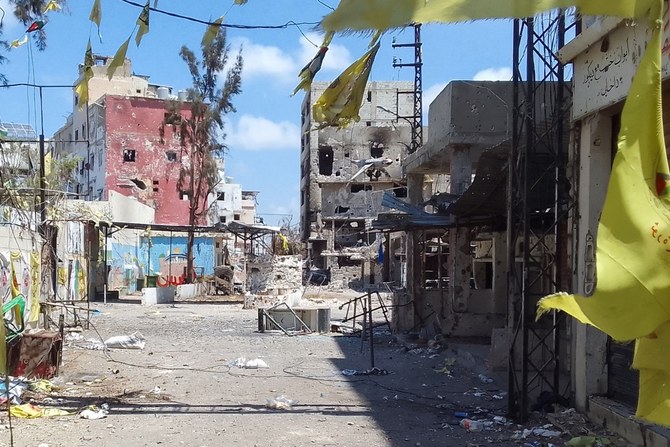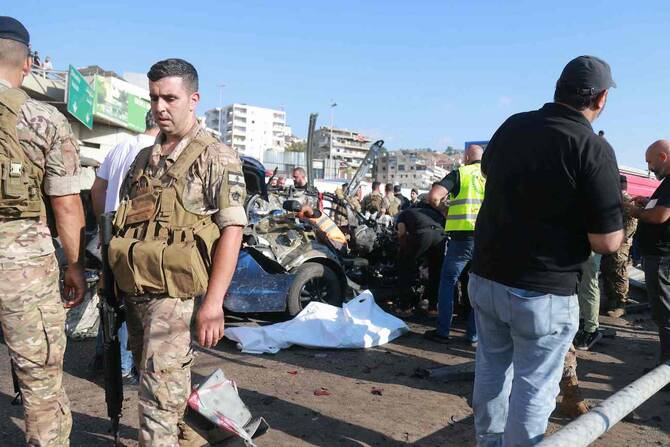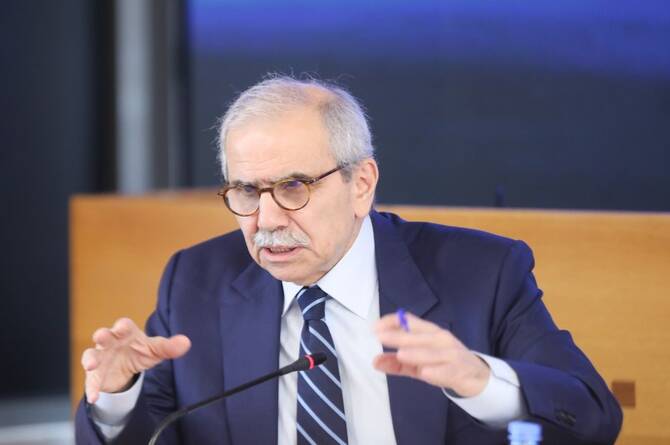NEW YORK CITY: The armed hostilities between July 30 and Aug. 3 at Ein El-Hilweh, a camp for Palestinian refugees in southern Lebanon, and their aftermath have once again shone a spotlight on the dire circumstances in which the camp residents are living.
Dorothy Klaus, director of the UN Relief and Works Agency for Palestine Refugees in the Near East, on Thursday described the effects of the violence on the people in the camps as “profound” as she called for an urgent and sustained aid effort.
She said that about 400 houses were destroyed during the recent hostilities and hundreds of families were displaced either within the camp or to nearby areas. The fighting also took a toll on vital infrastructure in the camp, including an UNRWA school complex that serves more than 3,000 children. The agency is still having difficulty accessing some parts of the camp, she added.
Ein El-Hilweh is the largest of 12 camps for Palestinian refugees that were established in Lebanon in 1948 after the creation of Israel. Since a 1969 agreement between Lebanese authorities and the Palestine Liberation Organization, the nation’s army has largely avoided entering the camps.
However, in the wake of the recent clashes between rival armed groups in Ein El-Hilweh, which left at least 11 people dead and dozens wounded, some Lebanese officials are calling for the military to take control of the camps.
Ein El-Hilweh, which is home to about 50,000 people, has experienced many bouts of violence over the decades, including interfactional fighting and clashes between Palestinian groups and Lebanese forces.
Klaus said that since the latest violence subsided, UNRWA has managed to restore essential services in “about 50 percent of the camp … we’ve been collecting garbage, disinfecting and started removing rubble there.”
But she painted a harrowing picture of “trauma and distress” among the residents, including “children having been traumatized, women’s hair having been turned white during the hostilities.”
The trauma experienced by communities of Palestinian refugees is deeply rooted in decades of displacement and conflict, Klaus added. The residents of many refugee camps, including Ain El-Helweh, have endured violent clashes and destruction of property many times, creating an environment in which psychological scars run deep, she said.
Traumatic experiences have also contributed to alarmingly high rates of non-communicable diseases, which Klaus attributed to extreme levels of stress among refugees.
Relations between camp residents and communities in surrounding areas add to the complexity of the situation, Klaus said as she highlighted the detrimental effects hostilities in camps can have on nearby locations. The city of Saida, for example, suffered economic losses during the recent violence due to shutdowns during the peak summer tourism season, she added.
This in a country that is four years into a devastating economic crisis during which the nation’s currency has lost about 98 percent of its value, gross domestic product has fallen by 40 percent, inflation is in triple digits, and about two-thirds of the central bank’s foreign-currency reserves have been drained, according to the International Monetary Fund. As a result, a large proportion of the population has been pushed into poverty.
This financial crisis has been exacerbated by vested interests among authorities in the country, which have resisted calls for the implementation of crucial economic and political reforms, the IMF said last month, warning that a continued lack of remedial action from authorities could lead the country “down an unpredictable road.”
Klaus told Arab News that this very fragile environment further complicates the relationship between Palestinian refugees and their host country, in which their access to employment opportunities is already restricted, along with property-ownership rights, and access to basic services.
She said the refugees, who had already been grappling with poverty, have been pushed into increasingly dire circumstances by the economic crisis and approximately 80 percent of them now live in impoverished conditions.
“Poverty has already been more than twice the level of what it used to be in the Lebanese population prior to the economic crisis,” Klaus said.
“So that means the resilience levels in the Palestinian population in Lebanon have been even less, with the impact of the crisis on employment (being) relegated to sectors which do not offer fixed employment. And Palestinians in Lebanon hardly ever have a regular contract, let alone any form of social security.
“So that means about 50 percent of men above the age of 16 are currently unemployed and the remainder have sporadic unemployment, and all of that difficulty is reflected in their income and their ability to sustain themselves.”






















